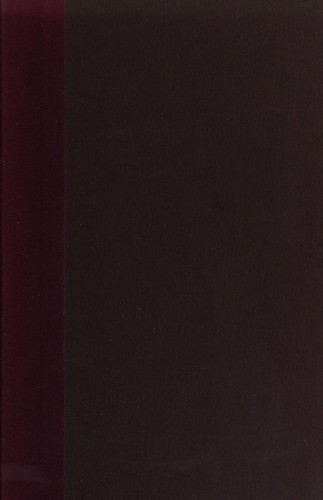Trial and error - Info and Reading Options
the American controversy over creation and evolution
By Edward J. Larson

"Trial and error" was published by Oxford University Press in 1989 - New York, it has 243 pages and the language of the book is English.
“Trial and error” Metadata:
- Title: Trial and error
- Author: Edward J. Larson
- Language: English
- Number of Pages: 243
- Publisher: Oxford University Press
- Publish Date: 1989
- Publish Location: New York
“Trial and error” Subjects and Themes:
- Subjects: ➤ Study and teaching - Law and legislation - Creationism - Evolution - History - Étude et enseignement - Evolution (Biology) - Evolutietheorie - Schöpfung - Civilisation - Religion et sciences - Évolutionnisme - Controverse moderniste-fondamentaliste - Histoire - Onderwijs - Droit - Creationisme - Éducation - Créationnisme - Öffentliche Schule - Evolutionstheorie - Geschichte - Schöpfungslehre - Biological Evolution - Wetgeving - Education - Évolution - Creation - Legislation
- Places: United States - États-Unis - USA
Edition Specifications:
- Pagination: 243 p. ;
Edition Identifiers:
- The Open Library ID: OL1938046M - OL1836810W
- Online Computer Library Center (OCLC) ID: 20730195 - 367330610
- Library of Congress Control Number (LCCN): 90157363 - 85007144
- ISBN-10: 0195061438
- All ISBNs: 0195061438
AI-generated Review of “Trial and error”:
Snippets and Summary:
The legal battles of the creation-evolution controversy, to a great extent, have centered on the contents of high-school science textbooks.
"Trial and error" Description:
The Open Library:
The debate over evolutionary teaching in the public schools remains one of the most emotion-charged controversies in twentieth-century America. This book, ranging from before the Scopes trial of 1925 to the creationism disputes of the 1980s, offers the first comprehensive account of th educational and legal battles erupting from this persistent confrontation. Analyzing the various teaching and text-book controversies as well as the statutes and court cases spawned by them Edward J. Larson concludes that public science education has never been allowed to deviate too far from public opinion. Thus, strong regional opposition in the 1920s the Darwinism resulted in bans on evolutionary teaching, while the Supreme Ccourt's overturning of those bans in 1968 came only when there seemed to be wider popular acceptance of the theory of evolution. The most recent legal efforts to secure equal time for creationism arose where public opinion appeared to favor such fairness for competing "scientific" ideas. While finding that legislators have responded more readily to public opinion than judges, Larson shows that even the courts have operated withing the boundaries set by public sentiment and have generally refused to rule on the scientific merits of either side's argument. As Larson observes, the creation-evolution issues continues to resurface because it has so divided public opinion as to prevent any hope of compromise, thus driving both sides to seek legal relief. Yet, as he points, out, that very division has kept either side form accepting an unfavorable legal resolution as final--and so the controversy rages on. About the Author: Edward J. Larson is a practicing attorney in Seattle, Washington and a former Counsel for the U.S. House of Representatives Committee on Education and Labor. He holds a law degree from Harvard and a Ph.D. in the history of science from the University of Wisconson. Annotation Published: November 2010. Larson's study examines the legal controversies over the teaching of evolutionary science in public schools. Initially, it focuses on textbooks that had substituted evolution for the biblical account of creation by 1900. It argues next that William Jennings Bryan, among others, shared the reformism of the Progressive Era and adopted its theory of ``interventionism'' to legislation against evolution as an acceptable explanation for creation. Even though Bryan lost credibility in the Scopes trial of 1925, Larson insists that a kind of truce ensued between the opposing forces and textbooks dealt cautiously with evolution thereafter until the 1960s. Both the growing public regard for science and changing court views on constitutional rights during the 1960s led to the legalization of the teaching of evolutionary theory. Although later judicial decisions defeated efforts to legitimate ``creation science,'' Larson concludes that in 1985 a final legal resolution was waiting for ``a verdict of popular opinion on evolution....'' The book offers limited analysis of its subject. Although Larson recognizes evangelical movements and rural-urban conflict, he does not explain the making of ``popular opinion.'' He also obscures in his discussion of Bryan reformism the primary indebtedness of antievolutionary forces to evangelical crusades for government action against intemperance and vice. The book contributes most with its description of the legal controversies. Public and academic libraries, community college level and up.-A.W. Hoglund, University of Connecticut.
Read “Trial and error”:
Read “Trial and error” by choosing from the options below.
Search for “Trial and error” downloads:
Visit our Downloads Search page to see if downloads are available.
Borrow "Trial and error" Online:
Check on the availability of online borrowing. Please note that online borrowing has copyright-based limitations and that the quality of ebooks may vary.
- Is Online Borrowing Available: Yes
- Preview Status: borrow
- Check if available: The Open Library & The Internet Archive
Find “Trial and error” in Libraries Near You:
Read or borrow “Trial and error” from your local library.
- The WorldCat Libraries Catalog: Find a copy of “Trial and error” at a library near you.
Buy “Trial and error” online:
Shop for “Trial and error” on popular online marketplaces.
- Ebay: New and used books.
